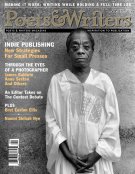If you were listening, you probably heard it coming—a new trend in literary magazines. Late last year the Audio Publishers Association reported a 14 percent increase in sales of audio books from 2001 to 2003, and estimated the size of the audio-book market at more than eight hundred million dollars. Hoping to ride this sound wave of success are several new audio literary magazines, including Verb (www.verb.org), the Relay Project (www.therelayproject.com), and From the Fishouse (www.fishousepoems.org). With the exception of From the Fishouse, which is available only on the Web, the contents of the magazines are recorded on compact discs. Daren Wang, the publisher of Verb, which is distributed by the University of Georgia Press, says the format broadens the traditional definition of a literary journal. “We can do things that no one else does,” says Wang, who also produces book-related programs for public radio. “Twenty-five years ago, Stuart Dybek, who writes both great poetry and fiction, wrote a song that was a response to a Thomas Lux poem. But he could never find a way to release it. We have the poem and the song back-to-back in the first issue. Where else could you do that?” The first issue of Verb, published this month, also includes a poem by the late James Dickey and an excerpt from an unpublished novel by Robert Olen Butler, each read by its author. Editors Rebecca Gates and Lucy Raven are taking a slightly more experimental approach to the Relay Project, which is “limited to things that make noise, but is otherwise boundless: interviews, stories, found and archival sound, virtual vacations, documentary, music, field recordings, affirmations, dissentions, voice, breath.” Although the first issue features more music than writing, it does include work by Joshua Beckman, Matthew Rohrer, and Barry Hannah. Launched by Matt O’Donnel in Pittston, Maine, From the Fishouse is a free archive of recordings, and features poems by Geoffrey Brock, Major Jackson, and Sean Singer. Named after the codfish-drying shack that the late Lawrence Sargent Hall renovated into his writing cabin, From the Fishouse aims to be an educational resource for students and teachers of contemporary poetry.
Like many literary magazines run exclusively by students—the Sonora Review (www.coh.arizona.edu/Sonora) and the Bridge (www.bridgew.edu/thebridge), for example—Columbia (www.columbia.edu/cu/arts/journal), the biannual journal published by Columbia University, has no permanent staff and is, therefore, constantly reinventing itself. This is not necessarily a bad thing, as issue no. 40, a retrospective of poetry, fiction, and creative nonfiction that has appeared in the journal since 1977, demonstrates. Contributors include poets Henri Cole, Fanny Howe, and Jack Gilbert, and fiction writers Jonathan Lethem, Sam Lipsyte, and Gary Lutz. But the most recent issue of Columbia introduces some recurring editorial features, including the use of illustrations and an editor’s note, that are designed to maintain “an essential unity over time.”
The current issue of Failbetter (www.failbetter.com), the online journal founded by Thom Didato in 2000, marks five years of publication—a blip in time for some, but to a literary magazine editor, it’s cause for celebration—with new writing by past contributors, including Steve Almond, Jim Shepard, and Terrance Hayes. The journal’s name was taken from Samuel Beckett’s Worstward Ho!: “Ever tried. Ever failed. No matter. Try again. Fail again. Fail better.”
Since most readers have probably never seen a literary magazine published in the Netherlands—let alone read much creative writing from the region—Megan Garr launched a journal in 2003 to “make known the diverse and talented energies of the Dutch international literary community while simultaneously bringing more of the world’s contemporary literatures into the Netherlands.” Published in Amsterdam and printed in Prague, the annual Versal (versal.wordsinhere.com) brings together poetry, prose, and artwork from the United States and Europe. The third issue includes familiar names like Naomi Shihab Nye and Russell Edson, along with not-so-familiar names like Anna Arov and Marc Swinkels.
Kevin Larimer is the senior editor of Poets & Writers Magazine.









